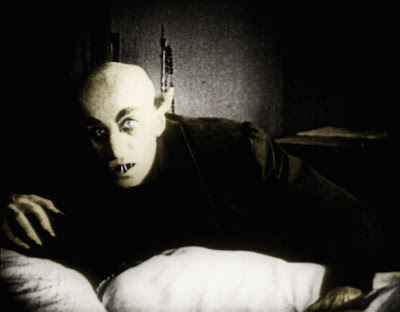I suppose we can not discuss it as being terrifying, for that is not what it sets out to do. "Horror" is the correct noun, in that much of what we see is horrible, as it slowly builds its tension and gruesomeness likes rats infesting a ship. But critics, I believe, look for reasons to define it as a scary picture by describing it as simply something that haunts you after it is over. I was not haunted by anything other than the knowledge that I have seen it three times now and three times have found it a waste of my energy.
It is the first vampire film and loosely based off of the novel "Dracula" by Bram Stoker. Director F. W. Murnau was never able to obtain the rights to the plot (or at least never bothered trying to pay for them) so made a few alterations to the story and changed the vampire's name to Orlok. A very clever idea. The story is a classic one, of a real estate agent who travels to some exotic, east European country to sell a piece of British property to the mysterious Count Orlok. While there, the count sees a picture of the agent's beautiful wife and falls in love with her. His obsession leads him to England to claim the woman as his bride, along the way sucking the blood of victims to keep him gruesomely alive.
The film has a number of qualities which speak in its favor. The first is a mesmerizing, frightening performance from Max Schreck as the vampire. Words are no use to describe him, but a look at him sends a chill down one's spine, especially considering that Murnau used nothing more than fake ears and teeth to alter his appearance. The man doesn't so much act as he does simply appear, moving, unblinking, with a slow exactness that is truly unnerving. As far as the creature himself is concerned, Schreck has fashioned the scariest of all vampires.

After that, the film's use of lighting and location filming adds terrific visual layers to the movie. Castles, tombs, creepy ships and abandoned houses do contribute to a sense of uneasiness throughout. Murnau's use of shadow is brilliant, especially in the film's final moments.
Where the film stumbles and falls is in its terrible adaptation of the great vampire story. I will give it the benefit of the doubt and say that its awful script was due mainly to the English translation I watched, but I am not entirely convinced. The film has lost all of the romanticism of the book, leaving it with a clunky feeling of uncertainty which left me more bored than amused. The only moments where the film was actually any good were the moments with Schreck, but his screen time was so small that percentage wise the movie lost my interest almost entirely.
As an allegory of WWI and the Weimar Republic "Nosferatu" can be read in a number of interesting ways. The monster movie genre seemed to emerge right from this period with the release of "The Cabinet of Dr. Caligari", but that is only really of any interest to a person who studies film in an historical context. So from that viewpoint I will not dwell on it, except to say that intellectually there is a bit of something that is stimulating, but as far as being watchable it does not help.
This film has always been one of the great let-downs for me. There are far superior movies in the same vein as this one, made at roughly the same time. Its praise is baffling, and my only reasoning for it is that it is insincere. If you are an historian or someone who really cares about film then I recommend it to you. You will sit and rub your chin and say "Mhmm" in the thoughtful way of a man who doesn't understand what he is watching at all. And then later you will be able to smugly go up to your friends and say that you've watched a silent, German expressionist film, thereby dazzling them with your worldliness. For the rest of you, however, go watch "Twilight".
2.5/4
No comments:
Post a Comment